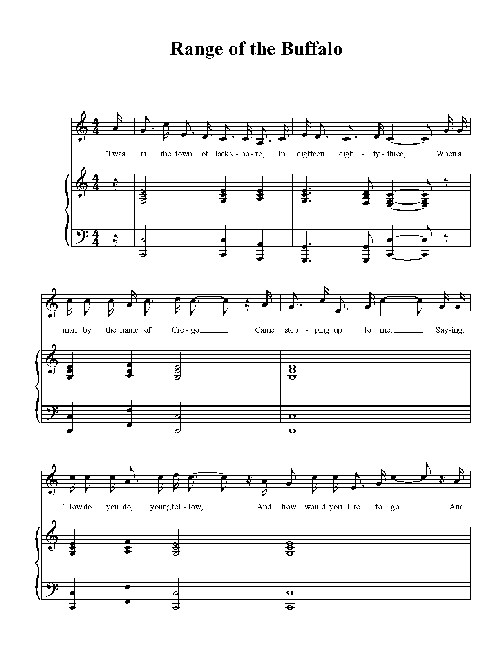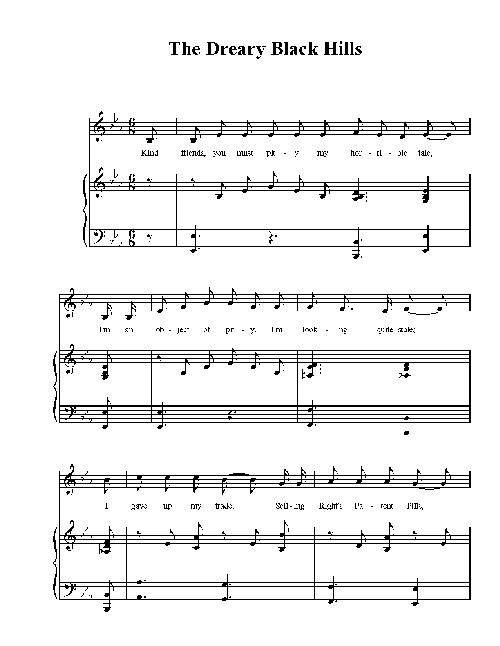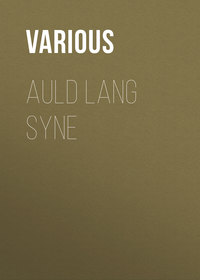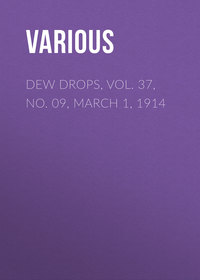Полная версия
Купить и скачать
Добавить В библиотеку
Cowboy Songs, and Other Frontier Ballads
Автор:
Жанр:
Год написания книги: 2019
Тэги:
Настройки чтения
Размер шрифта
Высота строк
Поля
THE BOSTON BURGLAR
I was born in Boston City, a city you all know well,Brought up by honest parents, the truth to you I'll tell,Brought up by honest parents and raised most tenderly,Till I became a roving man at the age of twenty-three.My character was taken then, and I was sent to jail.My friends they found it was in vain to get me out on bail.The jury found me guilty, the clerk he wrote it down,The judge he passed me sentence and I was sent to Charleston town.You ought to have seen my aged father a-pleading at the bar,Also my dear old mother a-tearing of her hair,Tearing of her old gray locks as the tears came rolling down,Saying, "Son, dear son, what have you done, that you are sent to Charleston town?"They put me aboard an eastbound train one cold December day,And every station that we passed, I'd hear the people say,"There goes a noted burglar, in strong chains he'll be bound,—For the doing of some crime or other he is sent to Charleston town."There is a girl in Boston, she is a girl that I love well,And if I ever gain my liberty, along with her I'll dwell;And when I regain my liberty, bad company I will shun,Night-walking, gambling, and also drinking rum.Now, you who have your liberty, pray keep it if you can,And don't go around the streets at night to break the laws of man;For if you do you'll surely rue and find yourself like me,A-serving out my twenty-one years in the penitentiary.SAM BASS
Sam Bass was born in Indiana, it was his native home,And at the age of seventeen young Sam began to roam.Sam first came out to Texas a cowboy for to be,—A kinder-hearted fellow you seldom ever see.Sam used to deal in race stock, one called the Denton mare,He matched her in scrub races, and took her to the Fair.Sam used to coin the money and spent it just as free,He always drank good whiskey wherever he might be.Sam left the Collin's ranch in the merry month of MayWith a herd of Texas cattle the Black Hills for to see,Sold out in Custer City and then got on a spree,—A harder set of cowboys you seldom ever see.On their way back to Texas they robbed the U.P. train,And then split up in couples and started out again.Joe Collins and his partner were overtaken soon,With all their hard-earned money they had to meet their doom.Sam made it back to Texas all right side up with care;Rode into the town of Denton with all his friends to share.Sam's life was short in Texas; three robberies did he do,He robbed all the passenger, mail, and express cars too.Sam had four companions—four bold and daring lads—They were Richardson, Jackson, Joe Collins, and Old Dad;Four more bold and daring cowboys the rangers never knew,They whipped the Texas rangers and ran the boys in blue.Sam had another companion, called Arkansas for short,Was shot by a Texas ranger by the name of Thomas Floyd;Oh, Tom is a big six-footer and thinks he's mighty fly,But I can tell you his racket,—he's a deadbeat on the sly.Jim Murphy was arrested, and then released on bail;He jumped his bond at Tyler and then took the train for Terrell;But Mayor Jones had posted Jim and that was all a stall,'Twas only a plan to capture Sam before the coming fall.Sam met his fate at Round Rock, July the twenty-first,They pierced poor Sam with rifle balls and emptied out his purse.Poor Sam he is a corpse and six foot under clay,And Jackson's in the bushes trying to get away.Jim had borrowed Sam's good gold and didn't want to pay,The only shot he saw was to give poor Sam away.He sold out Sam and Barnes and left their friends to mourn,—Oh, what a scorching Jim will get when Gabriel blows his horn.And so he sold out Sam and Barnes and left their friends to mourn,Oh, what a scorching Jim will get when Gabriel blows his horn.Perhaps he's got to heaven, there's none of us can say,But if I'm right in my surmise he's gone the other way.
THE ZEBRA DUN
We were camped on the plains at the head of the CimarronWhen along came a stranger and stopped to arger some.He looked so very foolish that we began to look around,We thought he was a greenhorn that had just 'scaped from town.We asked if he had been to breakfast; he hadn't had a smear,So we opened up the chuck-box and bade him have his share.He took a cup of coffee and some biscuits and some beans,And then began to talk and tell about foreign kings and queens,—About the Spanish war and fighting on the seasWith guns as big as steers and ramrods big as trees,—And about old Paul Jones, a mean, fighting son of a gun,Who was the grittiest cuss that ever pulled a gun.Such an educated feller his thoughts just came in herds,He astonished all them cowboys with them jaw-breaking words.He just kept on talking till he made the boys all sick,And they began to look around just how to play a trick.He said he had lost his job upon the Santa FéAnd was going across the plains to strike the 7-D.He didn't say how come it, some trouble with the boss,But said he'd like to borrow a nice fat saddle hoss.This tickled all the boys to death, they laughed way down in their sleeves,—"We will lend you a horse just as fresh and fat as you please."Shorty grabbed a lariat and roped the Zebra DunAnd turned him over to the stranger and waited for the fun.Old Dunny was a rocky outlaw that had grown so awful wildThat he could paw the white out of the moon every jump for a mile.Old Dunny stood right still,—as if he didn't know,—Until he was saddled and ready for to go.When the stranger hit the saddle, old Dunny quit the earthAnd traveled right straight up for all that he was worth.A-pitching and a-squealing, a-having wall-eyed fits,His hind feet perpendicular, his front ones in the bits.We could see the tops of the mountains under Dunny every jump,But the stranger he was growed there just like the camel's hump;The stranger sat upon him and curled his black mustacheJust like a summer boarder waiting for his hash.He thumped him in the shoulders and spurred him when he whirled,To show them flunky punchers that he was the wolf of the world.When the stranger had dismounted once more upon the ground,We knew he was a thoroughbred and not a gent from town;The boss who was standing round watching of the show,Walked right up to the stranger and told him he needn't go,—"If you can use the lasso like you rode old Zebra Dun,You are the man I've been looking for ever since the year one."Oh, he could twirl the lariat and he didn't do it slow,He could catch them fore feet nine out of ten for any kind of dough.And when the herd stampeded he was always on the spotAnd set them to nothing, like the boiling of a pot.There's one thing and a shore thing I've learned since I've been born,That every educated feller ain't a plumb greenhorn.THE BUFFALO SKINNERS
Come all you jolly fellows and listen to my song,There are not many verses, it will not detain you long;It's concerning some young fellows who did agree to goAnd spend one summer pleasantly on the range of the buffalo.It happened in Jacksboro in the spring of seventy-three,A man by the name of Crego came stepping up to me,Saying, "How do you do, young fellow, and how would you like to goAnd spend one summer pleasantly on the range of the buffalo?""It's me being out of employment," this to Crego I did say,"This going out on the buffalo range depends upon the pay.But if you will pay good wages and transportation too,I think, sir, I will go with you to the range of the buffalo.""Yes, I will pay good wages, give transportation too,Provided you will go with me and stay the summer through;But if you should grow homesick, come back to Jacksboro,I won't pay transportation from the range of the buffalo."It's now our outfit was complete—seven able-bodied men,With navy six and needle gun—our troubles did begin;Our way it was a pleasant one, the route we had to go,Until we crossed Pease River on the range of the buffalo.It's now we've crossed Pease River, our troubles have begun.The first damned tail I went to rip, Christ! how I cut my thumb!While skinning the damned old stinkers our lives wasn't a show,For the Indians watched to pick us off while skinning the buffalo.He fed us on such sorry chuck I wished myself most dead,It was old jerked beef, croton coffee, and sour bread.Pease River's as salty as hell fire, the water I could never go,—O God! I wished I had never come to the range of the buffalo.Our meat it was buffalo hump and iron wedge bread,And all we had to sleep on was a buffalo robe for a bed;The fleas and gray-backs worked on us, O boys, it was not slow,I'll tell you there's no worse hell on earth than the range of the buffalo.Our hearts were cased with buffalo hocks, our souls were cased with steel,And the hardships of that summer would nearly make us reel.While skinning the damned old stinkers our lives they had no show,For the Indians waited to pick us off on the hills of Mexico.The season being near over, old Crego he did sayThe crowd had been extravagant, was in debt to him that day,—We coaxed him and we begged him and still it was no go,—We left old Crego's bones to bleach on the range of the buffalo.Oh, it's now we've crossed Pease River and homeward we are bound,No more in that hell-fired country shall ever we be found.Go home to our wives and sweethearts, tell others not to go,For God's forsaken the buffalo range and the damned old buffalo.
MACAFFIE'S CONFESSION
Now come young men and list to me,A sad and mournful history;And may you ne'er forgetful beOf what I tell this day to thee.Oh, I was thoughtless, young, and gayAnd often broke the Sabbath day,In wickedness I took delightAnd sometimes done what wasn't right.I'd scarcely passed my fifteenth year,My mother and my father dearWere silent in their deep, dark grave,Their spirits gone to Him who gave.'Twas on a pleasant summer dayWhen from my home I ran awayAnd took unto myself a wife,Which step was fatal to my life.Oh, she was kind and good to meAs ever woman ought to be,And might this day have been alive no doubt,Had I not met Miss Hatty Stout.Ah, well I mind the fatal dayWhen Hatty stole my heart away;'Twas love for her controlled my willAnd did cause me my wife to kill.'Twas on a brilliant summer's nightWhen all was still; the stars shone bright.My wife lay still upon the bedAnd I approached to her and said:"Dear wife, here's medicine I've brought,For you this day, my love, I've bought.I know it will be good for youFor those vile fits,—pray take it, do."She cast on me a loving lookAnd in her mouth the poison took;Down by her infant on the bedIn her last, long sleep she laid her head.Oh, who could tell a mother's thoughtWhen first to her the news was brought;The sheriff said her son was soughtAnd into prison must be brought.Only a mother standing byTo hear them tell the reason whyHer son in prison, he must lieTill on the scaffold he must die.My father, sixty years of age,The best of counsel did engage,To see if something could be doneTo save his disobedient son.So, farewell, mother, do not weep,Though soon with demons I will sleep,My soul now feels its mental hellAnd soon with demons I will dwell.The sheriff cut the slender cord,His soul went up to meet its Lord;The doctor said, "The wretch is dead,His spirit from his body's fled."His weeping mother cried aloud,"O God, do save this gazing crowd,That none may ever have to payFor gambling on the Sabbath day."LITTLE JOE, THE WRANGLER
It's little Joe, the wrangler, he'll wrangle never more,His days with the remuda they are o'er;'Twas a year ago last April when he rode into our camp,—Just a little Texas stray and all alone,—On a little Texas pony he called "Chaw."With his brogan shoes and overalls, a tougher kidYou never in your life before had saw.His saddle was a Texas "kak," built many years ago,With an O.K. spur on one foot lightly swung;His "hot roll" in a cotton sack so loosely tied behind,And his canteen from his saddle-horn was swung.He said that he had to leave his home, his pa had married twice;And his new ma whipped him every day or two;So he saddled up old Chaw one night and lit a shuck this way,And he's now trying to paddle his own canoe.He said if we would give him work, he'd do the best he could,Though he didn't know straight up about a cow;So the boss he cut him out a mount and kindly put him on,For he sorta liked this little kid somehow.Learned him to wrangle horses and to try to know them all,And get them in at daylight if he could;To follow the chuck-wagon and always hitch the team,And to help the cocinero rustle wood.We had driven to the Pecos, the weather being fine;We had camped on the south side in a bend;When a norther commenced blowin', we had doubled up our guard,For it taken all of us to hold them in.Little Joe, the wrangler, was called out with the rest;Though the kid had scarcely reached the herd,When the cattle they stampeded, like a hailstorm long they fled,Then we were all a-ridin' for the lead.'Midst the streaks of lightin' a horse we could see in the lead,'Twas Little Joe, the wrangler, in the lead;He was riding Old Blue Rocket with a slicker o'er his head,A tryin' to check the cattle in their speed.At last we got them milling and kinda quieted down,And the extra guard back to the wagon went;But there was one a-missin' and we knew it at a glance,'Twas our little Texas stray, poor Wrangling Joe.The next morning just at day break, we found where Rocket fell,Down in a washout twenty feet below;And beneath the horse, mashed to a pulp,—his spur had rung the knell,—Was our little Texas stray, poor Wrangling Joe.
HARRY BALE
Come all kind friends and kindred dear and Christians young and old,A story I'll relate to you, 'twill make your blood run cold;'Tis all about an unfortunate boy who lived not far from here,In the township of Arcade in the County of Lapeer.It seems his occupation was a sawyer in a mill,He followed it successfully two years, one month, until,Until this fatal accident that caused many to weep and wail;'Twas where this young man lost his life,—his name was Harry Bale.On the 29th of April in the year of seventy-nine,He went to work as usual, no fear did he design;In lowering of the feed bar throwing the carriage into gearIt brought him down upon the saw and cut him quite severe;It cut him through the collar-bone and half way down the back,It threw him down upon the saw, the carriage coming back.He started for the shanty, his strength was failing fast;He said, "Oh, boys, I'm wounded: I fear it is my last."His brothers they were sent for, likewise his sisters too,The doctors came and dressed his wound, but kind words proved untrue.Poor Harry had no father to weep beside his bed,No kind and loving mother to sooth his aching head.He was just as gallant a young man as ever you wished to know,But he withered like a flower, it was his time to go.They placed him in his coffin and laid him in his grave;His brothers and sisters mourned the loss of a brother so true and brave.They took him to the graveyard and laid him away to rest,His body lies mouldering, his soul is among the blest.FOREMAN MONROE
Come all you brave young shanty boys, and list while I relateConcerning a young shanty boy and his untimely fate;Concerning a young river man, so manly, true and brave;'Twas on a jam at Gerry's Rock he met his watery grave;'Twas on a Sunday morning as you will quickly hear,Our logs were piled up mountain high, we could not keep them clear.Our foreman said, "Come on, brave boys, with hearts devoid of fear,We'll break the jam on Gerry's Rock and for Agonstown we'll steer."Now, some of them were willing, while others they were not,All for to work on Sunday they did not think they ought;But six of our brave shanty boys had volunteered to goAnd break the jam on Gerry's Rock with their foreman, young Monroe.They had not rolled off many logs 'till they heard his clear voice say,"I'd have you boys be on your guard, for the jam will soon give way."These words he'd scarcely spoken when the jam did break and go,Taking with it six of those brave boys and their foreman, young Monroe.Now when those other shanty boys this sad news came to hear,In search of their dead comrades to the river they did steer;Six of their mangled bodies a-floating down did go,While crushed and bleeding near the banks lay the foreman, young Monroe.They took him from his watery grave, brushed back his raven hair;There was a fair form among them whose cries did rend the air;There was a fair form among them, a girl from Saginaw town.Whose cries rose to the skies for her lover who'd gone down.Fair Clara was a noble girl, the river-man's true friend;She and her widowed mother lived at the river's bend;And the wages of her own true love the boss to her did pay,But the shanty boys for her made up a generous sum next day.They buried him quite decently; 'twas on the first of May;Come all you brave young shanty boys and for your comrade pray.Engraved upon the hemlock tree that by the grave does growIs the aged date and the sad fate of the foreman, young Monroe.Fair Clara did not long survive, her heart broke with her grief;And less than three months afterwards Death came to her relief;And when the time had come and she was called to go,Her last request was granted, to be laid by young Monroe.Come all you brave young shanty boys, I'd have you call and seeTwo green graves by the river side where grows a hemlock tree;The shanty boys cut off the wood where lay those lovers low,—'Tis the handsome Clara Vernon and her true love, Jack Monroe.THE DREARY BLACK HILLS
Kind friends, you must pity my horrible tale,I am an object of pity, I am looking quite stale,I gave up my trade selling Right's Patent PillsTo go hunting gold in the dreary Black Hills.Don't go away, stay at home if you can,Stay away from that city, they call it Cheyenne,For big Walipe or Comanche BillsThey will lift up your hair on the dreary Black Hills.The round-house in Cheyenne is filled every nightWith loafers and bummers of most every plight;On their backs is no clothes, in their pockets no bills,Each day they keep starting for the dreary Black Hills.I got to Cheyenne, no gold could I find,I thought of the lunch route I'd left far behind;Through rain, hail, and snow, frozen plumb to the gills,—They call me the orphan of the dreary Black Hills.Kind friend, to conclude, my advice I'll unfold,Don't go to the Black Hills a-hunting for gold;Railroad speculators their pockets you'll fillBy taking a trip to those dreary Black Hills.Don't go away, stay at home if you can,Stay away from that city, they call it Cheyenne,For old Sitting Bull or Comanche BillsThey will take off your scalp on the dreary Black Hills.
A MORMON SONG
I used to live on Cottonwood and owned a little farm,I was called upon a mission that gave me much alarm;The reason that they called me, I'm sure I do not know.But to hoe the cane and cotton, straightway I must go.I yoked up Jim and Baldy, all ready for the start;To leave my farm and garden, it almost broke my heart;But at last we got started, I cast a look behind,For the sand and rocks of Dixie were running through my mind.Now, when we got to Black Ridge, my wagon it broke down,And I, being no carpenter and forty miles from town,—I cut a clumsy cedar and rigged an awkward slide,But the wagon ran so heavy poor Betsy couldn't ride.While Betsy was out walking I told her to take care,When all of a sudden she struck a prickly pear,Then she began to hollow as loud as she could bawl,—If I were back in Cottonwood, I wouldn't go at all.Now, when we got to Sand Ridge, we couldn't go at all,Old Jim and old Baldy began to puff and loll,I cussed and swore a little, for I couldn't make the route,For the team and I and Betsy were all of us played out.At length we got to Washington; I thought we'd stay a whileTo see if the flowers would make their virgin smile,But I was much mistaken, for when we went awayThe red hills of September were just the same in May.It is so very dreary, there's nothing here to cheer,But old pathetic sermons we very often hear;They preach them by the dozens and prove them by the book,But I'd sooner have a roasting-ear and stay at home and cook.I am so awful weary I'm sure I'm almost dead;'Tis six long weeks last Sunday since I have tasted bread;Of turnip-tops and lucerne greens I've had enough to eat,But I'd like to change my diet to buckwheat cakes and meat.I had to sell my wagon for sorghum seed and bread;Old Jim and old Baldy have long since been dead.There's no one left but me and Bet to hoe the cotton tree,—God pity any Mormon that attempts to follow me!THE BUFFALO HUNTERS
Come all you pretty girls, to you these lines I'll write,We are going to the range in which we take delight;We are going on the range as we poor hunters do,And the tender-footed fellows can stay at home with you.It's all of the day long as we go tramping roundIn search of the buffalo that we may shoot him down;Our guns upon our shoulders, our belts of forty rounds,We send them up Salt River to some happy hunting grounds.Our game, it is the antelope, the buffalo, wolf, and deer,Who roam the wide prairies without a single fear;We rob him of his robe and think it is no harm,To buy us food and clothing to keep our bodies warm.The buffalo, he is the noblest of the band,He sometimes rejects in throwing up his hand.His shaggy main thrown forward, his head raised to the sky,He seems to say, "We're coming, boys; so hunter, mind your eye."Our fires are made of mesquite roots, our beds are on the ground;Our houses made of buffalo hides, we make them tall and round;Our furniture is the camp kettle, the coffee pot, and pan,Our chuck it is both bread and meat, mingled well with sand.Our neighbors are the Cheyennes, the 'Rapahoes, and Sioux,Their mode of navigation is a buffalo-hide canoe.And when they come upon you they take you unaware,And such a peculiar way they have of raising hunter's hair.THE LITTLE OLD SOD SHANTY
I am looking rather seedy now while holding down my claim,And my victuals are not always served the best;And the mice play shyly round me as I nestle down to restIn my little old sod shanty on my claim.The hinges are of leather and the windows have no glass,While the board roof lets the howling blizzards in,And I hear the hungry cayote as he slinks up through the grassRound the little old sod shanty on my claim.Yet, I rather like the novelty of living in this way,Though my bill of fare is always rather tame,But I'm happy as a clam on the land of Uncle SamIn the little old sod shanty on my claim.But when I left my Eastern home, a bachelor so gay,To try and win my way to wealth and fame,I little thought I'd come down to burning twisted hayIn the little old sod shanty on my claim.My clothes are plastered o'er with dough, I'm looking like a fright,And everything is scattered round the room,But I wouldn't give the freedom that I have out in the WestFor the table of the Eastern man's old home.Still, I wish that some kind-hearted girl would pity on me takeAnd relieve me from the mess that I am in;The angel, how I'd bless her if this her home she'd makeIn the little old sod shanty on my claim.And we would make our fortunes on the prairies of the West,Just as happy as two lovers we'd remain;We'd forget the trials and troubles we endured at the firstIn the little old sod shanty on my claim.And if fate should bless us with now and then an heirTo cheer our hearts with honest pride of fame,Oh, then we'd be contented for the toil that we had spentIn the little old sod shanty on our claim.When time enough had lapsed and all those little bratsTo noble man and womanhood had grown,It wouldn't seem half so lonely as round us we should lookAnd we'd see the old sod shanty on our claim.THE GOL-DARNED WHEEL
I can take the wildest bronco in the tough old woolly West.I can ride him, I can break him, let him do his level best;I can handle any cattle ever wore a coat of hair,And I've had a lively tussle with a tarnel grizzly bear.I can rope and throw the longhorn of the wildest Texas brand,And in Indian disagreements I can play a leading hand,But at last I got my master and he surely made me squealWhen the boys got me a-straddle of that gol-darned wheel.It was at the Eagle Ranch, on the Brazos,When I first found that darned contrivance that upset me in the dust.A tenderfoot had brought it, he was wheeling all the wayFrom the sun-rise end of freedom out to San Francisco Bay.He tied up at the ranch for to get outside a meal,Never thinking we would monkey with his gol-darned wheel.Arizona Jim begun it when he said to Jack McGillThere was fellows forced to limit bragging on their riding skill,And he'd venture the admission the same fellow that he meantWas a very handy cutter far as riding bronchos went;But he would find that he was bucking 'gainst a different kind of dealIf he threw his leather leggins 'gainst a gol-darned wheel.Such a slam against my talent made me hotter than a mink,And I swore that I would ride him for amusement or for chink.And it was nothing but a plaything for the kids and such about,And they'd have their ideas shattered if they'd lead the critter out.They held it while I mounted and gave the word to go;The shove they gave to start me warn't unreasonably slow.But I never spilled a cuss word and I never spilled a squeal—I was building reputation on that gol-darned wheel.Holy Moses and the Prophets, how we split the Texas air,And the wind it made whip-crackers of my same old canthy hair,And I sorta comprehended as down the hill we wentThere was bound to be a smash-up that I couldn't well prevent.Oh, how them punchers bawled, "Stay with her, Uncle Bill!Stick your spurs in her, you sucker! turn her muzzle up the hill!"But I never made an answer, I just let the cusses squeal,I was finding reputation on that gol-darned wheel.The grade was mighty sloping from the ranch down to the creekAnd I went a-galliflutin' like a crazy lightning streak,—Went whizzing and a-darting first this way and then that,The darned contrivance sort o' wobbling like the flying of a bat.I pulled upon the handles, but I couldn't check it up,And I yanked and sawed and hollowed but the darned thing wouldn't stop.Then a sort of a meachin' in my brain began to steal,That the devil held a mortgage on that gol-darned wheel.I've a sort of dim and hazy remembrance of the stop,With the world a-goin' round and the stars all tangled up;Then there came an intermission that lasted till I foundI was lying at the ranch with the boys all gathered round,And a doctor was a-sewing on the skin where it was ripped,And old Arizona whispered, "Well, old boy, I guess you're whipped,"And I told him I was busted from sombrero down to heel,And he grinned and said, "You ought to see that gol-darned wheel."








